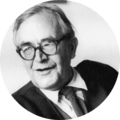Karl Barth
1886-1968
Returning to Christ’s Truth during the World’s Turmoil
About Karl Barth
Karl Barth was born in Basel, Switzerland, in 1886, the son and grandson of pastors. Barth was devoted to the study of theology from a young age, and was taught and influenced by scholars Adolf von Harnack, Friedrich Schleiermacher, and Wilhelm Herrman.
In the aftermath of World War I, unsatisfied with the rising school of liberal thought and theology, Barth dove into central Christian doctrines including the Word of God, creation, and reconciliation as seen in his life’s work, the Church Dogmatics.
Confronting division and nationalism in the church were common themes throughout his life and work. His original, bold, and authentic presentation of Scripture and Christ was unheard of at the time.
Often called the most important and influential Protestant theologian of the twentieth century, Barth continued his work on theology and ecumenism until his passing on December 9, 1968. His complex life and body of work remain a topic of interest for many theologians today.
Discover the story of this theologian through his own writing and the work he inspired.
“ ”
God is not what we know but that by which we know.

The Church Dogmatics
Published in 13 books over 35 years, the Church Dogmatics (Kirchliche Dogmatik) follows Barth’s theological convictions and class lectures from 1932 to 1967 as professor of systematic theology in the University of Basel, providing what Sinclair Ferguson calls “the weightiest contribution to Protestant theology since Schleiermacher.”
With a word count of over 6 million, the Church Dogmatics’ 4 volumes delve into essential Christian doctrines, including:
- The Doctrine of the Word of God
- The Doctrine of God
- The Doctrine of Creation
- The Doctrine of Reconciliation
These writings have influenced countless theologians, pastors and laypeople, who have come away from reading Barth with a renewed awe for the God of the Bible—whether or not they agree with Barth’s theology.
The new Church Dogmatics collection on the Logos platform includes both Barth’s original German and English translations by T&T Clark.
Unity in the Church
Despite being a somewhat divisive figure, Barth was a vocal advocate for the ecumenical movement, seeking unity between Catholic and Protestant churches. Barth believed that unity could—and only could—be found through believers’ common faith in Jesus Christ. Further, he defied the “German-Christian” movement of Nazi Germany as a primary author of the Barmen Declaration of 1934—an effort to unite the church in the truth of Christ over the “truth” of the day.
Explore resources from this pivotal time and related to his ecumenical cause
Politics in Wartime
As a pastor and professor during the two world wars, Barth was alarmed by Germany’s increasing militarism and the complicity of his former professors for this.
Immersing himself in the struggle of the German church and becoming a founding member of the Confessing Church, Barth championed the causes of Jews and oppressed people everywhere.
Consider Barth’s provocatively non-conformist political views that made him a theological leader and spiritual father to a generation.
Explore Works on Karl Barth's Political Views
In His Generation & Beyond
While Barth’s works were timely for the church—and the world—in the twentieth century, his theological teaching retains a timeless quality for today’s reader. Barth’s theology remains a cornerstone of scholarly study with a wealth of information to explore on the impact of this complex theologian.